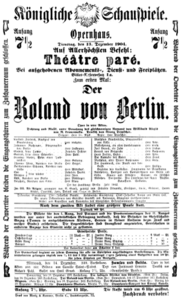The Roland of Berlin (Opera)
| Opera dates | |
|---|---|
| Title: | The Roland of Berlin |

Theater ticket for the premiere in 1904 |
|
| Shape: | Opera in four acts |
| Original language: | German Italian |
| Music: | Ruggero Leoncavallo |
| Libretto : | Ruggero Leoncavallo, Georg Dröscher |
| Literary source: | Willibald Alexis : The Roland of Berlin |
| Premiere: | December 13, 1904 |
| Place of premiere: | Berlin State Opera |
| Place and time of the action: | Berlin, 1442 |
| people | |
|
|
The Roland von Berlin is an opera in four acts (original name: "Historical Drama") by Ruggero Leoncavallo , who also wrote the libretto. It was premiered on December 13, 1904 in the Berlin State Opera.
action
The weaver Mollner loves the mayor's daughter, but the relationship is hampered by belonging to different social classes. The young man is elected head of the artillery uprising against the nobles and is called Roland, like the paladin, who is represented by a statue on a Berlin square. Elector Friedrich von Hohenzollern, who came to the city incognito, understands the rebels' motivation and demand for social justice, then he intervenes with the army to suppress the uprising and bring justice. During the siege, Mollner behaves heroically, but is accidentally killed.
Work history
Leoncavallo himself wrote the libretto for the opera in Italian. It is based on the historical novel of the same name by Willibald Alexis (1840).
At the premiere on December 13, 1904 in the Berlin State Opera , the opera was played in a German translation by Georg Dröscher . The leading roles were sung by Emmy Destinn (Elsbeth), Geraldine Farrar (Eva), Wilhelm Grüning (Henning), Baptist Hoffmann (Rathenow) and Paul Knüpfer (Frederick). Karl Muck was the musical director .
- Singer of the world premiere in 1904
The Italian première in the original language took place the following month under the title Rolando at the Teatro San Carlo in Naples .
literature
- Leo Melitz (ed.): Guide through the opera. 235 opera texts according to the content, the chants, the personnel and the change of scenery. Globus, Berlin 1906 ( Textarchiv - Internet Archive ).
- Horst Seeger : Opera Lexicon . Heinrichshofens Verlag, Wilhelmshaven 1987, ISBN 3-7959-0271-1 .
- Josef-Horst Lederer : "He failed because of a beginning that his ambition had not let him turn down ..." - On the criticism of R. Leoncavallo's historical drama "The Roland of Berlin". In: Lorenza Guiot / Jürgen Maehder : Letteratura, musica e teatro al tempo di Ruggero Leoncavallo. Atti del II ° Convegno Internazionale di Studi su Leoncavallo a Locarno 1993. Sonzogno, Milan 1995, pp. 181-192.
- Alan Mallach: The autumn of Italian opera: from Verismo to modernism, 1890-1915. Northeastern University Press, Lebanon 2007, ISBN 978-1-55553-683-1 , p. 252 ( limited preview in Google book search).
Web links
- The Roland of Berlin : Sheet music and audio files in the International Music Score Library Project
- Willibald Alexis : The Roland von Berlin in the Gutenberg-DE project
- The Roland von Berlin (Ruggiero Leoncavallo) in the Corago information system of the University of Bologna
- Work data for Der Roland von Berlin (Opera) based on the MGG with discography at Operone
- Karl Ulrich Spiegel: Booklet text for the CD Der Roland von Berlin
- Stefan Lauter, Klaus Ulrich Spiegel: Of German style. Verismo with a strong shot of Wagner. In: Opera Lounge
Individual evidence
- ^ Konrad Dryden: Leoncavallo: Life and Works. Scarecrow Press, Plymouth 2007, ISBN 978-0-8108-5880-0 , p. 90 ( limited preview in Google Book Search).



